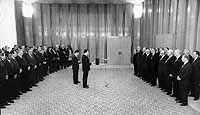The Council of State adopts an amnesty for all East German citizens who have left the country illegally. It provides that anyone arrested for trying to »flee the Republic« will be freed within three days and all charges based on this crime dropped. The amnesty also applies to people arrested at prohibited demonstrations.
The Council of Ministers rescinds the restrictions on travel to Czechoslovakia imposed on October 12. All East German citizens may now travel to their southeastern neighbor without a visa or passport. This also means that the stream of thousands of people leaving the country daily for West Germany via Czechoslovakia and Austria can swell again. However, open borders and a universal right to travel are still being ruled out.
In an interview with East German television, Prosecutor General Horst Wendland expressly rejects the elimination of the crime of »illegal border crossing.« He says that the border between East and West Germany separates »two incompatible systems« and must therefore be guarded reliably.
Protests begin to grow in small and medium-sized towns. This evening they are held in over 30 places, including Güstrow (20,000), Dessau (15,000), Saalfeld (10,000), Olbernhau (4,000), Parchim (4,000), Lauchhammer (3,500), and Großräschen (1,500).
© 1999, Christoph Links Verlag, Berlin

